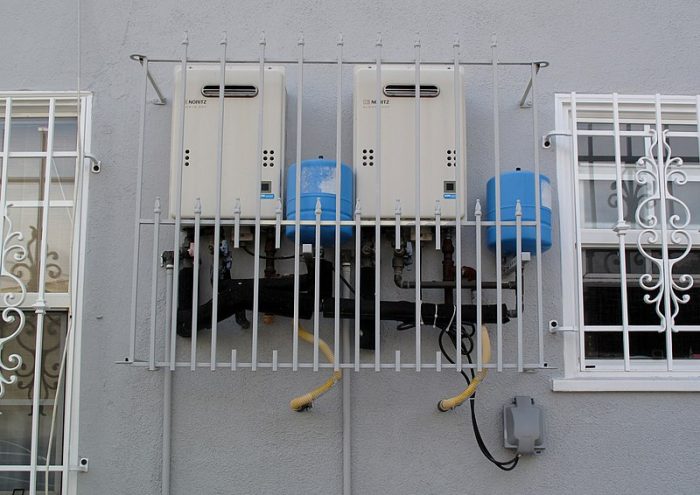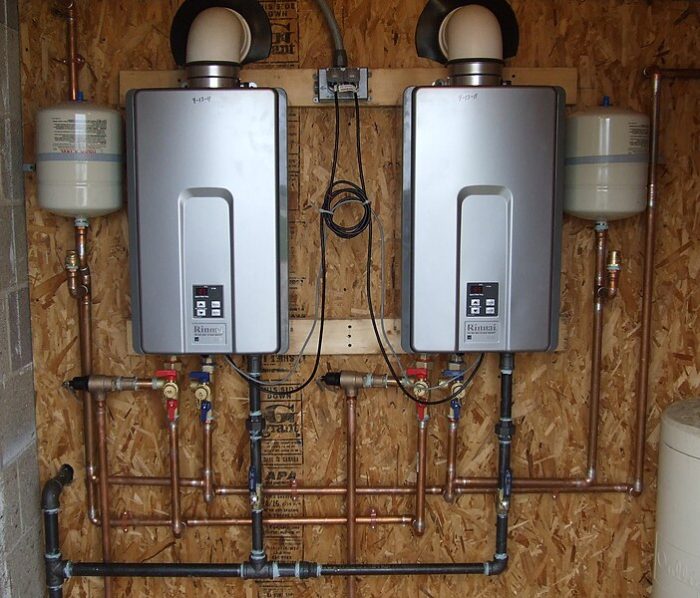
Modern alternatives to older models that store water in tanks include tankless water heaters, which are also called instantaneous or on-demand water heaters. A tankless water heater heats water on demand, as opposed to traditional models that store and constantly heat a significant volume of water.
Here are some benefits of installing a tankless water heater:
- Space and Installation
Because of their small size and ability to be mounted on walls or in tight quarters, they are space-saving and versatile.
- On-Demand Heating
Get hot water when you need it, rather than wasting energy heating a big tank of water all the time. Particularly for homes where hot water consumption varies, this leads to substantial energy savings.
- Heat Efficiency
Energy efficiency ratings ranging from 80 to 99 percent are common for systems like this because of their meticulous design. In order to maximize heating efficiency and minimize waste, modern tankless units come with cutting-edge technology.
- Maintenance and Longevity
It lasts far longer than the average tank (10–15 years) and sometimes much longer (20 years or more). They also require less regular maintenance because there is no tank to corrode or collect sediment.
- Energy Efficiency
These units only heat water when it is actually needed. Turning on a hot water tap causes cold water to flow into the tankless water heater via a pipe. The water is heated rapidly using either an electric element or a gas burner. This reduces standby energy losses since a huge volume of hot water is no longer needed in a tank.
Long lifespan and reduced maintenance
Here are several reasons why:
- No Standing Water
The accumulation of sediment and rust in a conventional water heater’s tank is a real problem. There is less chance of corrosion and sediment buildup, which can severely damage the unit, with tankless water heaters because they do not retain water.

- Efficiency
Reduced system strain is one benefit of tankless water heaters, which are typically more energy efficient. Unlike tank water heaters, they only heat water when you need it, so they don’t wear out as quickly or consume as much energy.
- High-Quality Components
A lot of modern tankless water heaters are constructed with long-lasting, high-quality parts. They frequently make use of materials that are less susceptible to corrosion and scaling.
- Upgradability
Tankless water heaters nowadays typically have smart technology and modern features that make them simple to maintain or upgrade, which extends their operational life.
- Less wear and tear
Water that is heated by a tankless heater is heated only when it is actually needed, as opposed to constant-temperature tank water heaters. As a result, the heating elements and other parts don’t have to endure constant strain.
- Maintenance
Any water heater, with regular maintenance, can last longer, although tankless versions are typically easier. In most cases, draining the system and descaling it to eliminate mineral buildup is easier and less frequent than the maintenance needed for tank-style heaters.
Environmental Impact
These water heaters offer several environmental benefits:
- Energy Efficiency:
- Higher Efficiency Ratings:
When compared to a conventional tank heater, a tankless water heater typically scores better in terms of energy efficiency. This results in less energy consumption for the same volume of hot water.
- Decreased Standby Heat Loss:
Conventional tank water heaters experience standby heat loss because they constantly heat and reheat water to keep it at a constant temperature. By only heating water when you need it, a tankless water heater drastically cuts down on energy consumption.
- Support for Renewable Energy
- Solar water heating systems and other renewable energy sources can be more seamlessly integrated with tankless water heaters. This is because the former can supply hot water on demand, and the latter can step in as a backup heater. As a result, we will rely less on fossil fuels and more on renewable energy.
- Lesser greenhouse gas emissions
- Less fossil fuels burned to heat water means less greenhouse gas emissions, thanks to the energy efficiency of a tankless water heater. This is particularly helpful in areas where power comes from fossil fuels.
- Minimal Water Wastage
- Users save time and energy by not having to wait for the water to heat up; a tankless water heater meets this need immediately. This can result in significant water savings over time.
- Smaller Physical Footprint
- A tankless water heater requires less material and is smaller in size. If implemented, production and transportation can have less of an impact on the environment.
- Reduced Possible Damage from Water
- Lessening the likelihood of water damage and leaks—which can have serious financial and ecological consequences—is possible without a big water tank. This minimizes the likelihood of water damage problems like mold growth.
- Longer Lifespan
- Compared to conventional tank water heaters, which normally only last around 10–15 years, tankless water heaters can last up to 20 years. Because of this, water heaters aren’t needed as often, and their production and disposal have less of an environmental impact.
Types of Tankless Water Heaters
Here are the main types of tankless water heaters:
- Point-of-Use (POU) Tankless Water Heaters
It’s perfectly positioned to heat water exactly where you need it, like next to an appliance or fixture.
Pros:
- Small and simple to set up.
- The amount of heat lost by the pipes is reduced.
- It streamlines the process of getting hot water.
Cons:
- It may be necessary to have multiple devices for use in different locations.
- Flow rate is restricted.
It’s perfect for occasional usage or small spaces, like a single bathroom shower or sink.
- Condensing tankless water heaters
These are able to heat the water more effectively by capturing heat from the exhaust gases.
Pros:
- Decreased energy expenses.
- Very effective.
Cons:
- Complicated installation
- Higher initial cost.
This is perfect for homes looking to reduce their energy expenses over time.
- Gas tankless water heaters
These heaters use a gas burner to heat your water.
Pros:
- If natural gas is cheap, operational expenses will be lower.
- Higher flow rates are typically provided by more powerful systems.
Cons:
- Expenses are higher initially.
- It requires proper ventilation and airing.
This is perfect for larger households that need more hot water.
- Non-Condensing Tankless Water Heaters
These release waste heat into the atmosphere instead of being reused.
Pros:
- Easy to install
- Compared to condensing models, this one has a lower starting cost.
Cons:
- Energy costs are higher.
- Not as effective.
This product is ideal for purchasers on a tighter budget who are looking for an easy fix.
- Electric tankless water heaters
These units use electric heating elements to heat your water.
Pros:
- Doesn’t require venting
- It has been reduced in size and made simpler to set up.
- Upfront costs are typically lower.
Cons:
- It may be necessary to improve the electrical system.
- If power is costly, operational expenses will be higher.
This product is ideal for single-family homes or other compact spaces with limited space.
- Tankless water heaters with propane
Using propane instead of gas, they function similarly to tankless heaters.
Pros:
- Functions even in places without access to natural gas pipelines.
- Energy-saving heating.
Cons:
- If propane is costly, operational expenses will be higher.
- Needs a sufficient supply of propane
It is perfect for locations without grid connectivity, like rural regions.
Considerations such as home size, hot water consumption, fuel source accessibility, and budget should be considered when selecting an appropriate tankless water heater.
Conclusion
A tankless water heater is a fantastic way to heat water for your house without taking up valuable floor space or harming the environment. Despite the higher upfront cost, many homeowners are drawn to them because of the numerous long-term benefits. This includes reduced energy bills and an endless supply of hot water.
